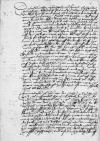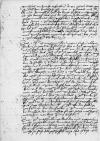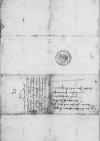Das ich bissher Ewer Irbarkeit ⌊⌋, / mir durch den edlenn ⌊Jorgen von Nebling⌋ gewordennn /, nicht geantwurt, / wil ich mein entschuldung / und etwan ein wunderliche zufellige ursach anczegenn. / Do gedochter ⌊Jorg⌋ zu ⌊Lublin⌋ bericht, / wie ich dis mol an ⌊koniglicher maiestet⌋ hove nicht werr / und er uff dem selbigen wege gesint koniglicher maiestet hoff zubesuchenn, / heth er ein botenn gewonnenn, / welcher mir seins hern ⌊pflaczgraff Fridrichenn⌋ ⌊⌋ / mit eynemm wallachenn, / den im der graff von Tarnow geschenkt, / hie her brengenn sold / und sich so uff den weg von Lublin gen hove begebenn. / Und do er so widerummb von Ewer Irbarkeit / an mich gelanget, / vormeynet er, ich het vorlengst briff und wallachen entfangen, / der ich keins biss uff dissen tag gesehenn, / wor aus gedochter ⌊Jorg⌋ vorursacht, / mit einemm meiner diner / widerummb gen ⌊Lublin⌋ sich begab / und gesternn erst mit demm brive / und vortorbenenn wallachenn hie her komenn etc. Und so ich zuvor biss uff disse zceit nicht hab mocht wissenn, / was in demm brive vorhaltenn, / do vonn / freuntlicher weis / Ewer Irbarkeit begert wissenschafft zu habenn, / ist mein schreiben noch blibenn etc.
Freuntlicherr, gnediger herr. Von den sachenn vil zuschreiben wil sich nicht wol czymenn, / idoch den grundt und meynung wil ich Ewer Irbarkeit / nicht bergenn. / Ich halts do vor, das Ewer Irbarkeit gut wissenn hab, wie ⌊romische konigliche maiestet⌋ sich eingegebenn, bey ⌊koniglicher maiestet⌋, unserem allergnedigsten hern, vor ⌊pfalczgraffen Fridrichenn⌋ ein heyrat zu stifftenn etc., darinnenn ich ouch in ⌊deuczen und Niderlandennn⌋ etwas gehandelt. / Und ist bisher ( weis nicht, aus was ursachenn ) durch ⌊romisch konigliche maiestet⌋ nicht volczogenn, / derhalben ich aus befhel, / gleich wie vor mich selbst, / ein volkomenn antwurt und entliche meynung zu wissenn / im sommer vorgangen / demm hern ⌊pfalczgraffenn⌋ ⌊⌋ / und erst durch gedochten brieff genczlich undericht erhaltenn, / do von ich vil lieber personlich, dan durch schriffte mit Ewer Irbarkeit / wolt reden etc. Do mit dennoch Ewer Irbarkeit / der dinge besloss muge wissenn, so ists daruff, / das aus der heyrat, / so durch ⌊romische konigliche maiestet⌋ vorgenomenn, / wie obenn geschriben, / nichts werden wil, / das denne Ewer Irbarkeit angefangnem handel ouch mit der ⌊Pfalcz⌋ wirt unschedlich seinn etc. Dis hab ich so in Ewer Irbarkeit / wissenheit zu bringenn / mich nicht mocht enthaldennn. Wolde dasselbige, / wie es vonn mir treuhercziger meÿnung ausgangen, / bey sich Ewer Irbarkeit / lossenn bleibenn etc.
Das Ewer Irbarkeit camermeisterr meyne sachenn allenthalbenn so wol und fleissig bey Ewer Irbarkeit / geworbenn, ouch gefurdert hot, / ist mir ein sundere freudt, / nemlich, / das sich Ewer Irbarkeit so gancz geneigt, / gunstig / und gutwillig gen mir / nicht allein in der coadiutorey, / alse kegenn ⌊Kostkenn⌋ erczegeth. / Bin derhalben Ewer Irbarkeit vil mher, dan zuvor, vorphlichtet, / wil ouch in undanckparheit von Ewer Irbarkeit nicht gespurt werden. / In dem erstenn gesche Gots wille. / Vorsehe mich ouch, Ewer Irbarkeit werde im korcz ⌊koniglicher maiestet⌋ gemuet hirinne ouch erlangen. / ⌊Kostkenn⌋ sache ghet nicht mich allein, / sunder ⌊land und stet⌋ ann, / von der wegenn sich der herr danczker castellann ⌊Czeme /⌋ disse tage / erstlich gen ⌊Peterkou⌋ / und darnoch zu ⌊koniglicher maiestet⌋ sich wirt begeben, / mit allemm bericht wol vorsorget etc. Mit im wil ich ouch al das jenige, das Ewer Irbarkeit bruder zu ehrenn, / guttem / und furderniss komenn mag, / ann ⌊konigliche maiestet⌋ und andere herrenn / fleissig vorschreiben und sage hochen danck Ewer Irbarkeit / vor die selbige zceitung, / die der halben Ewer Irbarkeit mir mitgeteilt. / Got der almechtige fuege solchs noch seymm gotlichen willen zum besten. /
Ewr Irbarkeit entschuldung, / das die mit eigener hant nicht geschribenn, / ist unnötig. / Ich weis, das Ewer Irbarkeit selden feyret, / alweg mit geschefftenn beladennn. / Das ich ouch nicht alweg schreib, / hindrenn mich nicht so fast die gescheffte, / alse das ich bose, unleseliche buchstabenn mole, / mit welchen ich nicht gernn Ewer Irbarkeit thu besverenn. / Wan der wille und das hercz gut ist, / leidt nicht daran, mit was hant geschribenn werd etc. /
Sunst weis ich dis mol Ewer Irbarkeit / nicht sunders zu schreibenn. / Was ich negst von ⌊Wien⌋ newes hab, / wirt Ewer Irbarkeit / aus hern ⌊doctornn Reynek⌋ schriftenn vorsthenn. / Mir ist vorkomenn, Ewer Irbarkeit wolde iren moler her schicken, / den ich gernn mit vil Ewer Irbarkeit conterfeytung wold sehenn. / Ich weis nicht, ab Ewer Irbarkeit das negste gemelde, / das ich allein kunst halben geschickt, / gefallenn. / Es suld sunst assche wordenn sein, / wie ich noch etliche hab, die darzu mussenn gedeyenn etc. Ewer Irbarkeit nem meynn unnucz schreiben vor gut uff / und losse mich nicht aus angefangner gunst. / Got der almechtige gebe der selbigen Ewer Irbarkeit / mit irem ⌊gemhael⌋ und geslecht / ein glukseligs newjarr / und vil ander in langweriger gesuntheit und glukseliger regirung. /



